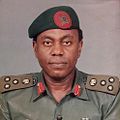| Governor of Cross River State | |
|---|---|
 Seal of Cross River State of Nigeria | |
 Flag of Cross River State of Nigeria | |
| Government of Cross River State | |
| Style |
|
| Member of | Executive Council of Cross River State [2] |
| Reports to | President of Nigeria |
| Residence | Government House, Essien |
| Seat | Calabar |
| Appointer | Popular vote [2] |
| Term length | Four years, renewable once consecutively [2] |
| Constituting instrument | Constitution of Nigeria |
| Inaugural holder | Clement Isong |
| Formation | October 1979 |
| Deputy | Deputy governor of Cross River State |

Cross River State, located in the South South geopolitical zone of Nigeria, has undergone political changes influenced by colonial rule, military regimes, and democratic transitions. The territory, which was originally under the Eastern Region, was incorporated into the newly created South-Eastern State in 1967 following the dissolution of the regional structure by the military government. [a] In 1967, military leader Yakubu Gowon established South-Eastern State from the Eastern Region as part of a broader state creation effort during the Nigerian Civil War. The state remained under military governance until 1979, when Nigeria transitioned briefly to civilian rule. In 1976, South-Eastern State was renamed Cross River State during the nationwide state reorganisation carried out by the Murtala Mohammed administration.
Contents
- List of governors
- Eastern Region
- South-Eastern State
- Cross River State
- Explanatory notes
- See also
- References
- Citations
- Works cited
Like other Nigerian states, Cross River State alternated between military administrators and civilian governors until the restoration of democracy in 1999. During the early years of the state, military officers such as Uduokaha Esuene, Paul Omu, and Babatunde Elegbede oversaw its administration. In 1979, Clement Isong of the National Party of Nigeria (NPN) became the first elected governor. However, his tenure, along with that of his successor Donald Etiebet, was interrupted by the military coup of December 1983. Subsequent military governors, including Edet Archibong, Dan Archibong, and Ernest Attah, managed the state until another brief return to civilian rule in 1992, which brought Clement Ebri of the National Republican Convention (NRC) into office. Following the annulment of the Third Republic in 1993, military administrators again assumed control, including Ibrahim Kefas, Gregory Agboneni, Umar Farouk Ahmed, and Christopher Osondu.
With the advent of the Fourth Republic in 1999, Cross River State returned to democratic governance, beginning with Donald Duke (1999–2007) of the Peoples Democratic Party (PDP). He was succeeded by Liyel Imoke (2007–2015), also of the PDP, followed by Benedict Ayade, who initially won under the PDP but later joined the All Progressives Congress (APC). In 2023, Bassey Otu of the APC was elected governor and is the incumbent.




